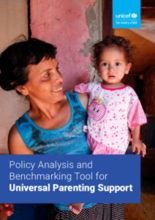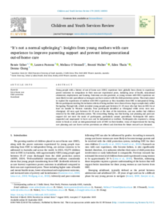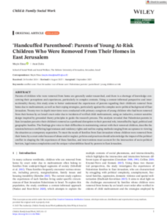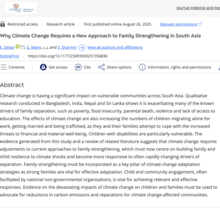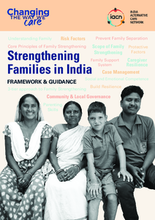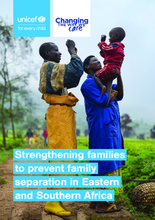Displaying 11 - 20 of 947
This document provides an overview of the Policy Analysis and Benchmarking Tool for Universal Parenting Support. The tool is intended to help governments analyse the current landscape of parenting support and plan for future expansion.
The article presents an in‑depth interview with the organisation This Life Cambodia, which works at the grassroots level in Cambodia to empower local communities around issues of social justice. It explores how community‑driven family‑strengthening approaches are applied in contexts of complex vulnerability, emphasising the importance of locally led support networks, culturally appropriate practices, and the agency of caregivers in sustaining positive family and community outcomes.
This study explored the experiences of 11 young mothers in Western Australia with out-of-home care (OHC) backgrounds, highlighting that leaving care planning and post-care support often failed to meet their needs, particularly around parenting. Participants felt underprepared and under-supported, but expressed determination to break cycles of OHC, pointing to the need for improved services and future research.
This paper outlines a research agenda to guide the initial stages of work of the new Notre Dame Strengthening Families (NDSF) Research Initiative in the U.S. This initiative is focused on building knowledge around the economics of families and evidence-based ways to promote and strengthen healthy families.
This study explores the experiences of Palestinian parents in East Jerusalem whose young children were removed from their homes due to verified maltreatment, highlighting the disruption to their parental roles and the added challenges of legal, political, and geographic barriers. Findings show how parents cope with separation, from acceptance to viewing it as temporary, and call for policies and interventions that address the intersecting socio-political and legal complexities shaping their lives.
Research across Bangladesh, India, Nepal, and Sri Lanka shows that climate change is intensifying drivers of family separation—including poverty, food insecurity, child migration, early marriage, and trafficking—while placing children with disabilities at heightened risk. The study calls for family strengthening to be a central pillar of climate adaptation strategies, emphasizing resilience-building, child and community engagement, and advocacy for both emission reductions and reparations for affected communities.
This study examined the long-term use of the Standard Triple P parenting program in Portugal’s child protection system, five years after 16 practitioners were accredited. Using a SWOT analysis and the Integrated Sustainability Framework, the study identified key strengths, weaknesses, opportunities, and threats affecting program sustainability, highlighting the need for deliberate planning to ensure evidence-based parenting programs are maintained over time and effectively reach families in need.
Strengthening Families in India: Framework & Guidance, jointly developed by India Alternative Care Network (IACN) and Changing the Way We Care (CTWWC), aims to consolidate existing knowledge, interventions, and promising practices led by government bodies and civil society organizations across India.
This paper explores strategies to prevent the separation of children from their families, drawing on evidence from Eastern and Southern Africa. It highlights the importance of strong care systems, holistic family support, and coordinated services to keep children safely within their families and communities.
This document provides comprehensive guidelines for designing, implementing, and evaluating effective and scalable parenting programs—including by examining their costs—particularly in low- and middle-income countries.

